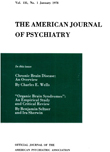An Indochinese refugee psychiatric clinic: culturally accepted treatment approaches
Abstract
In 1978 the authors established a weekly psychiatric clinic for Indochinese refugees. During the first 20 months, 50 patients were evaluated and treated at the clinic; a Vietnamese psychiatric resident and several native Indochinese mental health counselors bridged the language and cultural barriers between patients and clinic personnel. Most of the patients seen at the beginning of the program were psychotic and severely impaired. However, patients seen later suffered from a wider variety of problems. A flexible approach to treatment was adopted that would be compatible with the cultural expectations of the refugees. This resulted in the use of different forms of therapy and special emphasis on the medical approach of the physician, a role familiar to Indochinese patients. Gradually the clinic gained acceptance by members of the local refugee community.
Access content
To read the fulltext, please use one of the options below to sign in or purchase access.- Personal login
- Institutional Login
- Sign in via OpenAthens
- Register for access
-
Please login/register if you wish to pair your device and check access availability.
Not a subscriber?
PsychiatryOnline subscription options offer access to the DSM-5 library, books, journals, CME, and patient resources. This all-in-one virtual library provides psychiatrists and mental health professionals with key resources for diagnosis, treatment, research, and professional development.
Need more help? PsychiatryOnline Customer Service may be reached by emailing [email protected] or by calling 800-368-5777 (in the U.S.) or 703-907-7322 (outside the U.S.).



